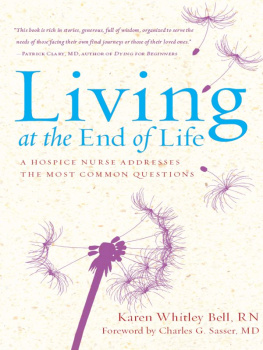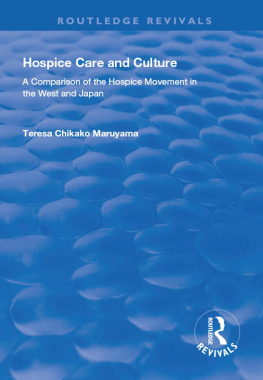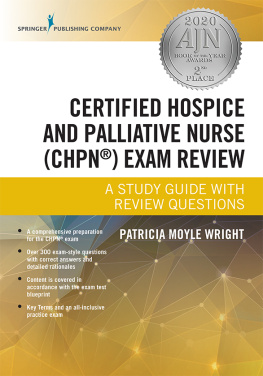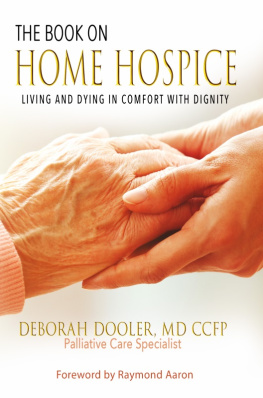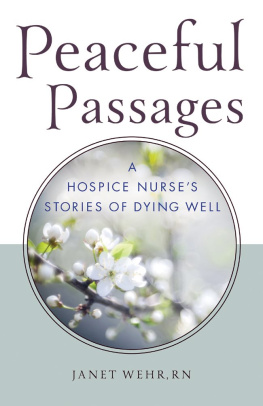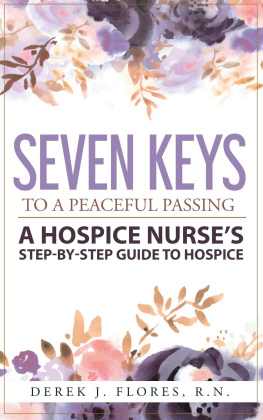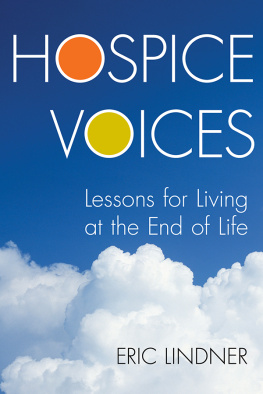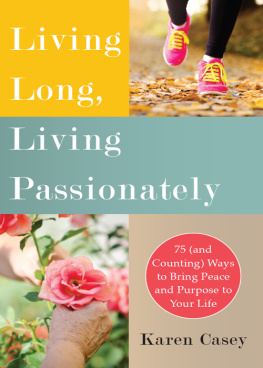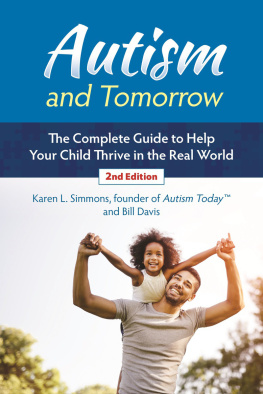Living
at the End of Life
Living
at the End of Life
A Hospice Nurse Addresses the Most Common Questions
Karen Whitley Bell, RN

STERLING and the distinctive Sterling logo are registered trademarks of Sterling Publishing Co., Inc.
Library of Congress Cataloging-in-Publication Data
Bell, Karen Whitley.
Living at the end of life: a hospice nurse addresses the most common questions/
Karen Whitley Bell.
p. cm.
Includes bibliographical references and index.
ISBN 978-1-4027-6838-5 1. Hospice care. 2. Hospice nurses. I. Title.
RT87.T45B45 2009
362.1756--dc22
2009023570
10 9 8 7 6 5 4 3 2 1
Published by Sterling Publishing Co., Inc.
387 Park Avenue South, New York, NY 10016
2010 by Karen Whitley Bell, RN
Distributed in Canada by Sterling Publishing
c/o Canadian Manda Group, 165 Dufferin Street
Toronto, Ontario, Canada M6K 3H6
Distributed in the United Kingdom by GMC Distribution Services
Castle Place, 166 High Street, Lewes, East Sussex, England BN7 1XU
Distributed in Australia by Capricorn Link (Australia) Pty. Ltd.
P.O. Box 704, Windsor, NSW 2756, Australia
Manufactured in the United States
All rights reserved
Sterling ISBN 978-1-4027-6838-5
For information about custom editions, special sales, premium and
corporate purchases, please contact Sterling Special Sales
Department at 800-805-5489 or specialsales@sterlingpublishing.com.
DEDICATION
For All the Families, and For B
CONTENTS
Chapters can be read in any order, based on your needs. You do not need to read theentire guide. Read only what you feel will be of value to you.
What Will It Be Like?
An Overview of the End-of-Life Journey
Will I Be Alone?
Will Others Be with You in Your Final Days or Hours?
Will I Choose My Time?
Does the Mind or Spirit Influence When We Pass?
Will I Be Aware?
The Possibility of Consciousness, Even If Were Not Awake or Responsive
I Had This Dream...
A Description of Common Dream Themes
What Should I Do Now?
Expressing Your Wishes
How to Complete Advance Directive and Medical Power of Attorney Forms
Will I Be in Pain?
How Pain Medication Works
When to Use It
What to Tell Your Doctor
How to Minimize Side Effects
Understanding Common Pain Medication Myths
I Dont Want to Be a Burden...
Ways to View and Cope with Dependence
I Wish I Had More Energy...
Tools to Maximize Energy and Mobility
Do I Want to Help Plan My Remembrance Service?
Ways to Explore This Topic with Loved Ones
Ive Never Done This Before...
An Overview of Caregiving
What Does Hospice Do?
An Explanation of Services
Why Early Access to Hospice Can Help You and Your Loved Ones
What If We Dont Have Hospice Care?
Tips for Accessing Resources
Making the Most of Your Visit with Your Doctor
Guidance for Managing Care in a Rural Community
I Cant Do This Alone...
Suggestions to Gather, Organize, and Manage Support from Friends,
Neighbors, and Loved Ones
How Can I Keep Him Safe?
Understanding and Reducing Risks for Both the Individual and Caregiver
How Do I Bring the Bathroom to Him?
Options for Toileting and Bathing
I Dont Know What to Say...
Insights to Achieve a Meaningful Visit
He Doesnt Want to Eat...
Understanding and Adapting to a Changing Appetite
Ideas for Adapting Meal Schedules for People with Memory Impairment
Suggestions for Easy-to-Digest Foods and Beverages
For Loved Ones Who Live Far Away: What Can I Do?
Staying Informed and Supportive
Deciding When to Visit
Im Exhausted! Exploring Care Settings Outside the Home
Choosing a Care Facility, If Needed, and Paying for Care
Im Afraid to Lose Control...
Examining the Fear of Loss of Control and Discovering Ways
to Achieve Peace
Im Not Ready...
Making the Most of the Time You Have
Is It Too Late to Make Amends?
Achieving Reconciliation, Forgiveness, and Healing
Im ReadyWhy Am I Not Going?
Understanding and Achieving Acceptance and Peace
Why Me? Why Am I Being Punished?
Reconciling Mortality with Your Religious Beliefs
We Always Thought Wed Have More Time...
Realizing Dreams and Appreciating the Choices You Have Made
How Do We Keep Her Comfortable?
Giving Medication When Your Loved One Can No Longer Swallow
Recognizing If Your Loved One Is in Pain
Preventing Discomfort
How Do I Let Go?
Saying Good-bye: Helping Your Loved One Achieve Peace
How Will We Know When the End Is Near?
Changes You May See
Understanding What These Changes Mean
I Want to Be with Her When She Passes...
Meeting Your Loved Ones Needsand Yoursin the Final Days
Ideas to Create a Peaceful Environment
I Want My Last Memory to Be a Good Memory...
What to Do at the Time of Death
Ideas for Honoring and Caring for Your Loved One at the Time of Death
I Feel So Alone...
An Introduction to Grief and Bereavement
How Are You?
How Love and Loss Shape Who We Are
Is There Life after Death?
Does It Influence How I Live Now?
Appendices
Appendix A: Additional Resources
FOR MOST OF US, FACING INCURABLE, life-threatening illness in ourselves or a loved one is a terrifying experience. Although we may have considered the possibility, it is not something we can actively plan for, and its effects usually take us by surprise. There are a number of how to books on the market filled with practical hints to guide newcomers encountering lifes final chapter. In the category of end-of-life literature are autobiographies of people stricken with illness, philosophical and spiritual musings, and scientific textbooks. As the population ages and chronic illness becomes more commonplace, self-help survival guides are added to the collection.
Living at the End of Life is much more than a self-help manual. By inserting real-life dialogue into the extensive list of issues to be faced, Karen Whitley Bell places the reader at bedsides during one of the most intimate of lifes dramas. Reading about what others have experienced and the common questions they have asked gives a firsthand feel to the narrative. People grappling with illness and their caregivers often find themselves overwhelmed with questions about a future they are afraid to contemplate, and dont know how or what to ask. This book asks those questions, and the follow-up answersprovided in the context of discussions among givers and receivers of careoffer reassurance, encouragement, and hope.
The language people use with each other and with their health care professionals about dying often lead to the most intimate and profound of conversations. After nearly thirty years in hospice and palliative care, I continue to be awed by how people facing life-threatening illness describe their plight, as well as both the healing and damaging potential of the language health care professionals choose in end-of-life conversations. A key to excellence in palliative care is the recognition that when it comes to the art of dying, they are the teachers and we the students. Palliative specialists provide expertise in comfort and pain and symptom management, and they receive in return remarkable insights into the illness experience, provided by the only ones who really know what its like. We are all wounded in some way and, in the care of those with incurable, terminal illness, the distinction between givers and receivers of care becomes blurred.
Next page
